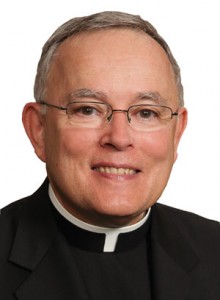 November is a time to recall in a special way the souls of the faithful departed who’ve gone before us. Martyrs are among those we venerate, and they came from all walks of life. They were men and women, old and young, laypeople, priests and religious. Martyrdom means bearing witness to Jesus Christ by living, and when necessary dying, for our faith in Jesus Christ. As Jesus said, “Greater love has no man than this, that he lay down his life for his friends” (Jn 15:13). He spoke these words before he gave his own life for us on the cross, showing us exactly what he meant.
November is a time to recall in a special way the souls of the faithful departed who’ve gone before us. Martyrs are among those we venerate, and they came from all walks of life. They were men and women, old and young, laypeople, priests and religious. Martyrdom means bearing witness to Jesus Christ by living, and when necessary dying, for our faith in Jesus Christ. As Jesus said, “Greater love has no man than this, that he lay down his life for his friends” (Jn 15:13). He spoke these words before he gave his own life for us on the cross, showing us exactly what he meant.
In giving their lives for Christ, martyrs follow in his footsteps. A prayer of the Early Church speaks of the martyrs rejoicing with Jesus in heaven because they poured out their blood for love of him. Martyrdom is ultimately beautiful because it shines with the love of God.
But in another sense, martyrdom is a grave injustice and a sign of sin in the world. Martyrdom involves attacks on Christian men and women precisely because of their belief in Jesus. Living in America today, we tend to think of persecution as something remote; something that happened to other Christians in other times. We’re grateful for the freedom to practice our faith that belongs to our nation’s heritage.
[hotblock]
Many other Christians are not so blessed. For many of our brothers and sisters around the world, living the faith comes at a bitter price. A Christian man loses his job or pays fines. A Christian woman is beaten or put to death. Even if we don’t see it happening in our own churches, the 21st century is already an age of bloody martyrdom.
Christians in the Middle East bear a special burden of violence and bigotry. Head of the Chaldean Catholic community in Mosul, Iraq, Archbishop Amel Shamon Nona was appointed in 2010 after his predecessor was gruesomely murdered by Muslim extremists. He watched as month after month, more Christians fled his city. The brutal violence made him wonder how anyone can live the faith in a time of extraordinary suffering.
Archbishop Nona came to this conclusion: “During a time of crisis and persecution, we must remain full of hope.” That may sound implausibly pious, but we need to hear his words in detail:
“I realized that, above all – in the face of suffering and persecution – a true knowledge of our own faith and the cause of our persecution is of fundamental importance. By deepening our sense of what it means to be Christians, we discover ways to give meaning to this life of persecution and find the necessary strength to endure it. … From the moment when we are waiting for death, under threat from someone who may shoot us at any time, we need to know how to live well. The greatest challenge in facing death because of our faith is to continue to know this faith in such a way as to live it constantly and fully – even in that very brief moment that separates us from death.
“My goal in all this is to reinforce the fact that the Christian faith is not an abstract, rational theory, remote from actual, everyday life but a means of discovering its deepest meaning, its highest expression as revealed by the Incarnation. When the individual discovers this possibility, he or she will be willing to endure absolutely anything and will do everything to safeguard this discovery – even if this means having to die in its cause.”
What can we in the United States do for Christians around the world who are suffering persecution right now? Material support is an obvious need, and vitally important. But first and even more crucial, Archbishop Nona tells us, is this: Live the faith in a deeper way. Give suffering Christians the gift of knowing that their burdens encourage us to love Jesus Christ more. If we’re free to live as members of the body of Christ, we should live our faith all the more vigorously for those who have no such freedom. The archbishop also urges us to protect our own religious freedom and to resist every attempt at intimidation that we face in our own country.
By living out our faith with courage and conviction, we too become “martyrs” in the truest sense of the word: witnesses to the love of Jesus Christ. Nothing less can soften the heart of the world and lead persons of good will to God.
***
Archbishop Nona’s comments can be found here.
Material support for the Church in the Middle East can be sent to Aid to the Church in Need or the Catholic Near East Welfare Association.
PREVIOUS: The meaning of sainthood: To be fully alive in Jesus Christ
NEXT: The Feminine Genius: A conference that shouldn’t be missed



Beautifully said your Emminence. God bless.